不及物动词没有被动语态
英语不能用被动语态的情况

不能用被动语态的情况初中语法:1) 不及物动词或动词短语无被动语态:appear, die disappear, end (vi. 结束), fail, happen, last, lie, remain, sit, spread, stand break out, come true, fall asleep, keep silence, lose heart, take place.After the fire, very little remained of my house.比较:rise, fall, happen是不及物动词;raise, seat是及物动词。
(错) The price has been risen.(对) The price has risen.(错) The accident was happened last week.(对) The accident happened last week.(错) The price has raised.(对) The price has been raised.(错) Please seat.(对) Please be seated.要想正确地使用被动语态,就须注意哪些动词是及物的,哪些是不及物的。
特别是一词多义的动词往往有两种用法。
解决这一问题唯有在学习过程中多留意积累。
2) 不能用于被动语态的及物动词或动词短语:fit, have, hold, marry, own, wish, cost, notice, watch agree with, arrive at / in, shake hands with, succeed in, suffer from, happen to, take part in, walk into, belong to This key just fits the lock.Your story agrees with what had already been heard.3) 系动词无被动语态:appear, be become, fall, feel, get, grow, keep, look, remain, seem, smell, sound, stay, taste, turnIt sounds good.4) 带同源宾语的及物动词,反身代词,相互代词,不能用于被动语态:die, death, dream, live, lifeShe dreamed a bad dream last night.5) 当宾语是不定式时,很少用于被动语态。
不及物动词有被动语态吗
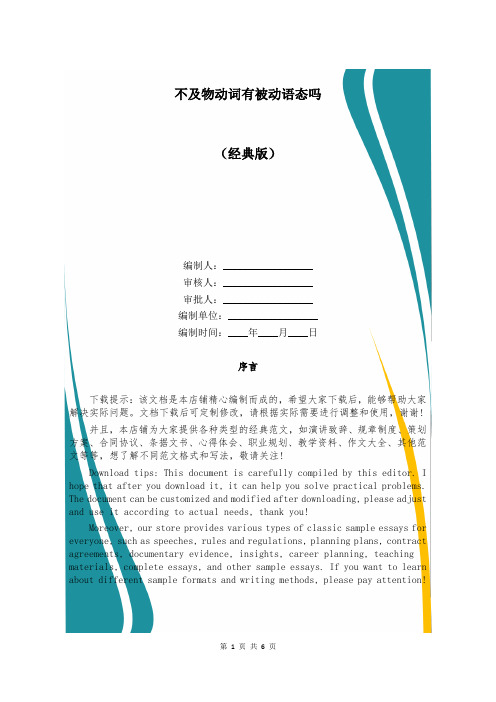
不及物动词有被动语态吗(经典版)编制人:__________________审核人:__________________审批人:__________________编制单位:__________________编制时间:____年____月____日序言下载提示:该文档是本店铺精心编制而成的,希望大家下载后,能够帮助大家解决实际问题。
文档下载后可定制修改,请根据实际需要进行调整和使用,谢谢!并且,本店铺为大家提供各种类型的经典范文,如演讲致辞、规章制度、策划方案、合同协议、条据文书、心得体会、职业规划、教学资料、作文大全、其他范文等等,想了解不同范文格式和写法,敬请关注!Download tips: This document is carefully compiled by this editor. I hope that after you download it, it can help you solve practical problems. The document can be customized and modified after downloading, please adjust and use it according to actual needs, thank you!Moreover, our store provides various types of classic sample essays for everyone, such as speeches, rules and regulations, planning plans, contract agreements, documentary evidence, insights, career planning, teaching materials, complete essays, and other sample essays. If you want to learn about different sample formats and writing methods, please pay attention!不及物动词有被动语态吗有关不及物动词有被动语态吗在英语的学习中,不及物动词有被动语态吗?纯的不及物动词是这样的,因为主动语态:主语+谓语(及物动词)+宾语。
被动语态

不用被动语态的几种情况1.不及物动词不能用于被动语态。
➢The sun is rising.➢When did the thing occur?2.系动词(look、sound、feel、smell、taste、appear、seem、go、prove、turn、become、fall、get、keep)不能用于被动语态。
➢It sounds very good.3.表示开始、结束、运动的动词(begin、start、finish、open、close、stop、end、shut、run、move)不用于被动语态。
➢Class begins at eight o’clock.4.read、write、wash、smell、wear、lock等动词与well、easily、smoothly等连用时,主动形式表被动意义.➢The pen writes smoothly.➢The coat washes easily.5.一部分动词(print fry hang build make)用进行时,就可以表示被动意义。
➢The novel is painting.➢The supper is cooking6.这些动词(need want require deserve),以物做主语时,后面接的动名词的主动形式表被动意义。
➢My watch needs/wants/requires repairing.➢Who said the boy deserves punishing?7.一部分及物动词(fit、wish、cost、leave、enter、reach、suit、benefit、lack、own)不用于被动语态。
8.一些动词短语(break out、take place、lose heart、come true、belong to、consist of、add up to、suffer from、happen to、take part in)不能用于被动语态。
初中英语语法大全:不用被动语态

初中英语语法大全:不用被动语态各位读友大家好,此文档由网络收集而来,欢迎您下载,谢谢初中英语语法大全:不用被动语态不用被动语态的情况1) 不及物动词或动词短语无被动语态:appear, die disappear, end , fail, happen, last, lie, remain, sit, spread, stand break out, come true, fall asleep, keep silence, lose heart, take place.After the fire, very little remained of my house.比较:rise, fall, happen是不及物动词;raise, seat是及物动词。
The price has been risen.The price has risen.The accident was happened last week.The accident happened last week.The price has raised.The price has been raised.Please seat.Please be seated.要想正确地使用被动语态,就须注意哪些动词是及物的,哪些是不及物的。
特别是一词多义的动词往往有两种用法。
解决这一问题唯有在学习过程中多留意积累。
2) 不能用于被动语态的及物动词或动词短语:fit, have, hold, marry, own, wish, cost, notice, watch agree with, arrive at / in, shake hands with, succeed in, suffer from, happen to, take part in, walk into, belong toThis key just fits the lock.Your story agrees with what had already been heard.3) 系动词无被动语态:appear, be become, fall, feel, get,grow, keep, look, remain, seem, smell, sound, stay, taste, turnIt sounds good.4) 带同源宾语的及物动词,反身代词,相互代词,不能用于被动语态:die, death, dream, live, lifeShe dreamed a bad dream last night.5) 当宾语是不定式时,很少用于被动语态。
不用被动语态的情况

不用被动语态的情况1) 不及物动词或动词短语无被动语态:appear, die disappear, end (vi. 结束), fail, happen, last, lie, remain, sit, spread, standbreak out, come true, fall asleep, keep silence, lose heart, take place.After the fire, very little remained of my house.比较: rise, fall, happen是不及物动词;raise, seat是及物动词。
(错) The price has been risen.(对) The price has risen.(错) The accident was happened last week.(对) The accident happened last week.(错) The price has raised.(对) The price has been raised.(错) Please seat.(对) Please be seated.要想正确地使用被动语态,就须注意哪些动词是及物的,哪些是不及物的。
特别是一词多义的动词往往有两种用法。
解决这一问题唯有在学习过程中多留意积累。
2) 不能用于被动语态的及物动词或动词短语:fit, have, hold, marry, own, wish, cost, notice, watch agree with, arrive at / in, shake hands with, succeed in, suffer from, happen to, take part in, walk into, belong toThis key just fits the lock.Your story agrees with what had already been heard.3) 系动词无被动语态:appear, be become, fall, feel, get, grow, keep, look, remain, seem, smell, sound, stay, taste, turnIt sounds good.4) 带同源宾语的及物动词,反身代词,相互代词,不能用于被动语态:die, death, dream, live, lifeShe dreamed a bad dream last night.5) 当宾语是不定式时,很少用于被动语态。
英语语法:不用被动语态的情况
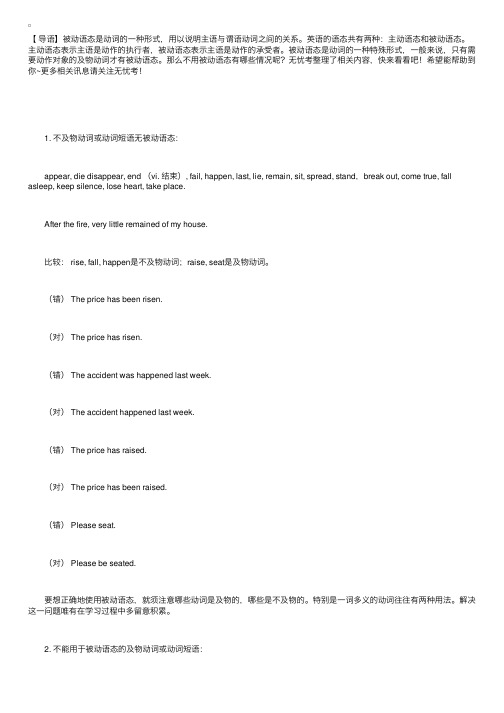
【导语】被动语态是动词的⼀种形式,⽤以说明主语与谓语动词之间的关系。
英语的语态共有两种:主动语态和被动语态。
主动语态表⽰主语是动作的执⾏者,被动语态表⽰主语是动作的承受者。
被动语态是动词的⼀种特殊形式,⼀般来说,只有需要动作对象的及物动词才有被动语态。
那么不⽤被动语态有哪些情况呢?⽆忧考整理了相关内容,快来看看吧!希望能帮助到你~更多相关讯息请关注⽆忧考! 1. 不及物动词或动词短语⽆被动语态: appear, die disappear, end (vi. 结束), fail, happen, last, lie, remain, sit, spread, stand,break out, come true, fall asleep, keep silence, lose heart, take place. After the fire, very little remained of my house. ⽐较: rise, fall, happen是不及物动词;raise, seat是及物动词。
(错) The price has been risen. (对) The price has risen. (错) The accident was happened last week. (对) The accident happened last week. (错) The price has raised. (对) The price has been raised. (错) Please seat. (对) Please be seated. 要想正确地使⽤被动语态,就须注意哪些动词是及物的,哪些是不及物的。
特别是⼀词多义的动词往往有两种⽤法。
解决这⼀问题唯有在学习过程中多留意积累。
2. 不能⽤于被动语态的及物动词或动词短语: fit, have, hold, marry, own, wish, cost, notice, watch agree with, arrive at / in, shake hands with, succeed in, suffer from, happen to, take part in, walk into, belong to This key just fits the lock. Your story agrees with what had already been heard. 3. 系动词⽆被动语态: appear, be become, fall, feel, get, grow, keep, look, remain, seem, smell, sound, stay, taste, turn It sounds good. 4.带同源宾语的及物动词,反⾝代词,相互代词,不能⽤于被动语态: die, death, dream, live, life She dreamed a bad dream last night. 5. 当宾语是不定式时,很少⽤于被动语态。
高中英语被动语态用法详解
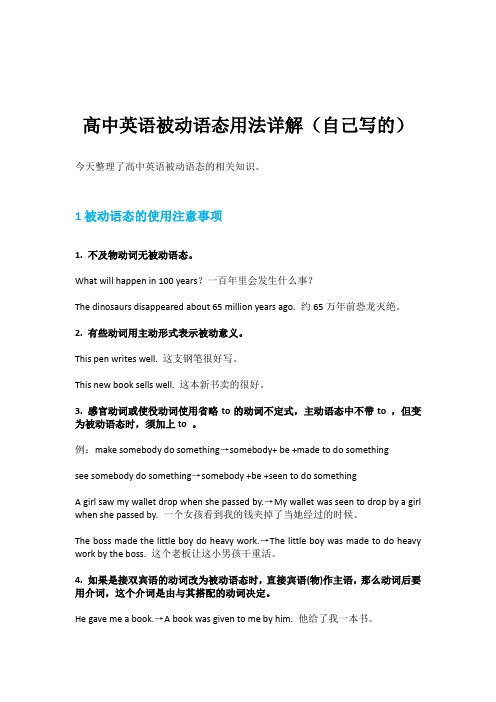
高中英语被动语态用法详解(自己写的)今天整理了高中英语被动语态的相关知识。
1被动语态的使用注意事项1. 不及物动词无被动语态。
What will happen in 100 years?一百年里会发生什么事?The dinosaurs disappeared about 65 million years ago. 约65万年前恐龙灭绝。
2. 有些动词用主动形式表示被动意义。
This pen writes well. 这支钢笔很好写。
This new book sells well. 这本新书卖的很好。
3. 感官动词或使役动词使用省略to的动词不定式,主动语态中不带to ,但变为被动语态时,须加上to 。
例:make somebody do something→somebody+ be +made to do somethingsee somebody do something→somebody +be +seen to do somethingA girl saw my wallet drop when she passed by.→My wallet was seen to drop by a girl when she passed by. 一个女孩看到我的钱夹掉了当她经过的时候。
The boss made the little boy do heavy work.→The little boy was made to do heavy work by the boss. 这个老板让这小男孩干重活。
4. 如果是接双宾语的动词改为被动语态时,直接宾语(物)作主语,那么动词后要用介词,这个介词是由与其搭配的动词决定。
He gave me a book.→A book was given to me by him. 他给了我一本书。
He showed me a ticket.→A ticket was shown to me by him. 他给我展示了一张票。
不及物动词没有被动语态
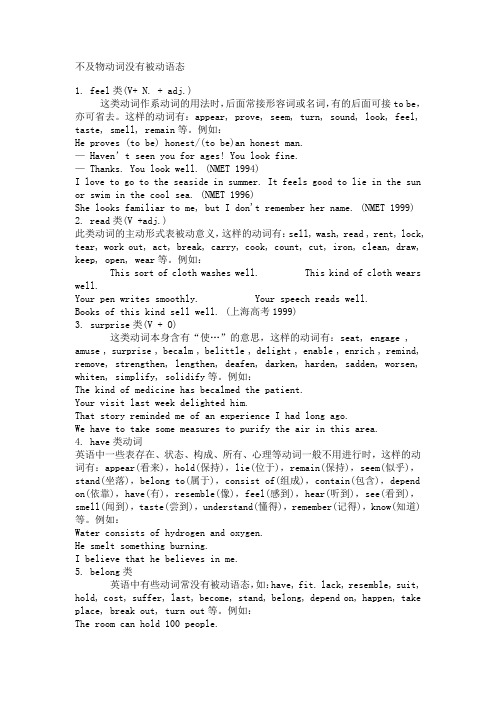
不及物动词没有被动语态1. feel类(V+ N. + adj.)这类动词作系动词的用法时,后面常接形容词或名词,有的后面可接to be,亦可省去。
这样的动词有:appear, prove, seem, turn, sound, look, feel, taste, smell, remain等。
例如:He proves (to be) honest/(to be)an honest man.—Haven’t seen you for ages! You look fine.— Thanks. You look well. (NMET 1994)I love to go to the seaside in summer. It feels good to lie in the sun or swim in the cool sea. (NMET 1996)She looks familiar to me, but I don't remember her name. (NMET 1999) 2. read类(V +adj.)此类动词的主动形式表被动意义,这样的动词有:sell, wash, read , rent, lock, tear, work out, act, break, carry, cook, count, cut, iron, clean, draw, keep, open, wear等。
例如:This sort of cloth washes well. This kind of cloth wears well. Your pen writes smoothly. Your speech reads well.Books of this kind sell well. (上海高考1999)3. surprise类(V + O)这类动词本身含有“使…”的意思,这样的动词有:seat, engage , amuse , surprise , becalm , belittle , delight , enable , enrich , remind, remove, strengthen, lengthen, deafen, darken, harden, sadden, worsen, whiten, simplify, solidify等。
【高中英语语法 语态】不用被动语态的情况英语听力

【高中英语语法语态】不用被动语态的情况I. 无被动语态的动词:除不及物动词无被动语态外,有另外六类动词无被动语态:1.某些表示静态的及物动词:have,fit,lack,resemble(像),suit,hold(容纳),cost,suffer,last(持续)等。
He has a good car.(不说:A good car is had…)他有一辆好汽车。
They were having a bath then.(不说:A bath was being had…)那时他们正在洗澡。
The shoes don't fit me.(不说:I'm not fitted by…)这双鞋不合适我。
He resembles his father.(不说:His father is resembled by…)他长得像他父亲。
The shirt suits me well.(不说:I'm suited by…)这衬衫很合我身。
The room can hold 500 people.(不说:500 people can be held by…)这房间能容纳500个人。
The book cost me five dollars.(不说:I was cost five dollars by…)这本书花了我5美元。
They suffered heavy losses.(不说:They were suffered…)他们损失惨重。
2.某些由及物动词转变的自动词:这些动词有人称之为主动形式,被动意义,也有人称之为自动词。
顾名思义,自动词是说动词的动作是由主语自身所产生的。
既然是主语自身产生的动作,就根本不存在被动语态了。
这类动词常见的有:promise(有指望),sell,wash,write,wear,read,break out,run out,give out,add up to,take place,turn out(证实),catch(挂住),等。
高三复习-怎么区分英语及物和不及物动词

怎么区分英语及物和不及物动词区别在于是否直接跟宾语,及物动词后跟宾语才能表达完整的语义。
不及物动词后不跟宾语,也能够表达具体语义。
及物动词可以用于主动语态,大多有被动语态;不及物动词有主动语态,但没有被动语态。
区分方法1.及物动词(vt):后面必须跟宾语意义才完整的实义动词,叫做及物动词。
比如:I believe that the committee will consider our suggestion.我相信委员会将会考虑我们的建议.这句话里的believe, consider都是及物动词(vt),believe后面跟了宾语从句;consider后面跟了宾语our suggestion2.不及物动词(vi):本身意义完整后面不须跟宾语的实义动词,叫做不及物动词。
比如:1)Birds fly.鸟会飞.fly是不及物动词,因为这一个动词表意完整,无需跟宾语。
2)My watch stopped.我的表停了.Stop是不及物动词,表示“停止”,后面不跟宾语。
3.在英文中还有一种特殊的情况,那就是一个动词兼具及物、和不及物的属性。
比如:之前图片中的act,即可以作为及物动词,表示“扮演、装作”(后面跟宾语);又可以作为不及物动词,表示“行动”。
两用动词英语里有不少实义动词可以兼作及物动词和不及物动词。
这样的动词又有两种不同的情况:a)兼作及物动词和不及物动词时,意义不变。
试比较:Shall I begin at once?我可以立刻开始吗?(begin作不及物动词) She began working as a librarian after she left school.她毕业后当图书馆管理员。
(begin 作及物动词)When did they leave Chicago? 他们是什么时候离开芝加哥的?(leave作及物动词)My watch stopped.我的表停了。
They left last week. 他们是上周离开的。
英语中不用被动语态的几种情况

英语中不用被动语态的几种情况(最新版)编制人:__________________审核人:__________________审批人:__________________编制单位:__________________编制时间:____年____月____日序言下载提示:该文档是本店铺精心编制而成的,希望大家下载后,能够帮助大家解决实际问题。
文档下载后可定制修改,请根据实际需要进行调整和使用,谢谢!并且,本店铺为大家提供各种类型的经典范文,如词性大全、句法大全、句型大全、从句大全、时态大全、语态大全、语法大全、虚拟语气、用法辨析、其他资料等等,想了解不同范文格式和写法,敬请关注!Download tips: This document is carefully compiled by this editor.I hope that after you download it, it can help you solve practical problems. The document can be customized and modified after downloading, please adjust and use it according to actual needs, thank you!In addition, this shop provides you with various types of classic sample essays, such as part of speech, syntax, sentence pattern, clause, tense, voice, grammar, subjunctive, usage analysis, other materials, etc. If you want to know the different formats and writing methods of the model essay, please pay attention!英语中不用被动语态的几种情况1. 谓语为连系动词时,不用被动语态。
没有被动语态的动词

没有被动语态的动词作者:佚名文章来源:本站原创及物动词和一些相当于及物动词的动词短语一般有自己的被动语态。
1.The truth must be found out . (动词+副词)2.The slow students shouldn’t be looked down upon. (动词+副词+介词) 上面句子中的动词或动词短语一般有自己的宾语,都可以象这样改为被动语态,但是要注意下列情况。
一、系动词和不及物动词没有被动语态。
She seemed tired after she worked a whole day.常见的系动词look (看起来),sound (听起来),taste (尝起来),smell (闻起来),feel(感到),go(变得),grow (变得)等。
二、一些不能接宾语的动词短语当然也有被动语态。
1.The war broke out in 1937.2.The story took place in a small mountain village.三、甚至有些及物动词和可以接宾语的动词短语要看他们作什么意思讲,有时也只能有主动语态而不宜于用被动语态。
1.We have six classes every day. (上课)2.The hall can hold more than 500 people. (容纳)3.The project lasted 14 years and cost I billion US dollars. (延续) 4.No dish suits all tastes. (适合)类似的还有fit ,catch ,get ,take ,own ,meet 等。
四、而有些动词和短语兼有及物和不及物两种用法,所以前者有被动语态,而后者没有。
1.He serves in the Navy Department. (服役,不及物)2.Hamburger is served in this restaurant. (供应,及物)3.The plane toke off at eight last night. (起飞,不及物)类似的还有look into (作往里看,不及物;作调查、研究,及物)look up (作好转,不及物;作查阅,及物)等。
不用或不能用被动语态的情况

不用或不能用被动语态的情况1. 不及物动词(vi.)没有承受着,所以是不可能用于被动语态的。
如:1)He went home.2)Mr. Li began to speak. The teachers and the students listened carefully.当然,不及物动词(vi.)后面跟上介词时相当于及物动词(vt.),就可以用于被动语态了。
如:Mr. Li began to speak. The teachers and the students listened to him carefully.→Mr. Li began to speak. He was listened to carefully by the teachers and thestudents.2. 有些表示状态的及物动词(vt.)(往往是不能用于进行时的vt.)如have、let、cost、hold(容纳,盛下)等,不表示动作,不可用于被动语态。
如:1)I have some new books. √→Some books are had by me. ×2)The bus holds fifty people. √这个汽车能坐50人。
→Fifty people were held by the bus. ×3. 当及物动词(vt.)所带的宾语是表示地点、处所(有时包括组织、团体)等时,一般不能改为被动语态。
如:1)He left Beijing. √→Beijing was left by him. ×2)He entered(走进)the classroom. √→The classroom was entered by him. ×3)He joined the English club last week. √→The English club was joined by him last week. ×说明:一般地说,判断一个主动句能否转换为被动句,主要看其宾语是否真的受到动作的影响,是否真的“被触及”了。
无被动语态的动词及短语
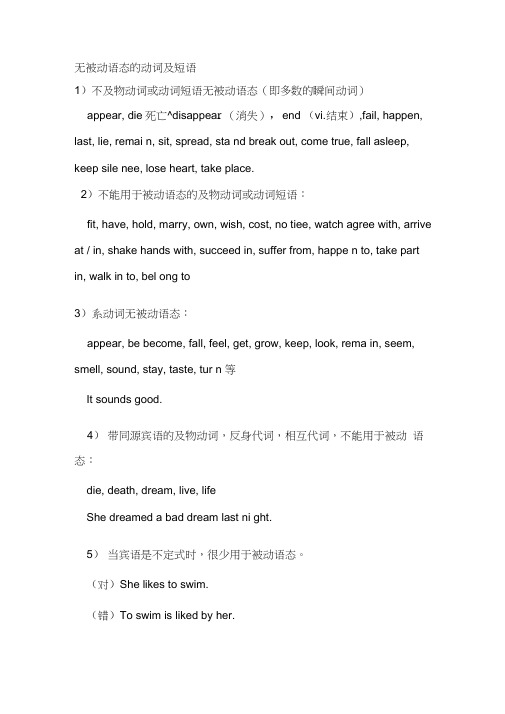
无被动语态的动词及短语
1)不及物动词或动词短语无被动语态(即多数的瞬间动词)
appear, die死亡^disappea r (消失),end (vi.结束),fail, happen, last, lie, remai n, sit, spread, sta nd break out, come true, fall asleep, keep sile nee, lose heart, take place.
2)不能用于被动语态的及物动词或动词短语:
fit, have, hold, marry, own, wish, cost, no tiee, watch agree with, arrive at / in, shake hands with, succeed in, suffer from, happe n to, take part in, walk in to, bel ong to
3)系动词无被动语态:
appear, be become, fall, feel, get, grow, keep, look, rema in, seem, smell, sound, stay, taste, tur n 等
It sounds good.
4)带同源宾语的及物动词,反身代词,相互代词,不能用于被动语态:
die, death, dream, live, life
She dreamed a bad dream last ni ght.
5)当宾语是不定式时,很少用于被动语态。
(对)She likes to swim.
(错)To swim is liked by her.。
不能用被动语态的几种情况

不能用被动语态的几种情况。
①所有的不及物动词或不及物动词词组不能用于被动语态之中。
②表示状态的谓语动词,如:last、hold、benefit、contain、equal、fit、join、mean、last、look like、consist to 等。
③表示归属的动词,如have、own、belong to等。
④表示“希望、意图”的动词,如:wish、want、hope、like、love、hate等。
⑤宾语是反身代词或相互代词时谓语动词用主动语态,不能用被动语态。
⑥宾语是同源宾语,不定式、动名词等谓语动词不用被动语态。
⑦有些动词以其主动形式表示被动意义,特别是当主语是物时,常见的动词有sell、write、wash、open、lock等。
主动形式表被动意义。
①当feel、look、smell、taste、sound等后面接形容词时;当cut、read、sell、wear、write等词带状语修饰语时;当动词表示“开始、结束、关、停、转、启动”等意义时。
This kind of cloth washes easily.这种布易洗。
These novels won’t sell well.这些小说不畅销。
My pen writes smoothly.我的钢笔写起来很流畅。
The door won’t lock.门锁不上。
The fish smells good.鱼闻起来香。
②当breakout、take place、shutoff、turnoff、workout 等动词表示“发生、关闭、制定”等意思时。
The plan worked out successfully. The lamps on the wall turn off.③want, require, need后面的动名词用主动表示被动含义。
④be worth doing用主动形式表示被动含义。
⑤在“be+形容词+to do”中,不定式的逻辑宾语是句子的主语,用主动代被动。
英语被动语态
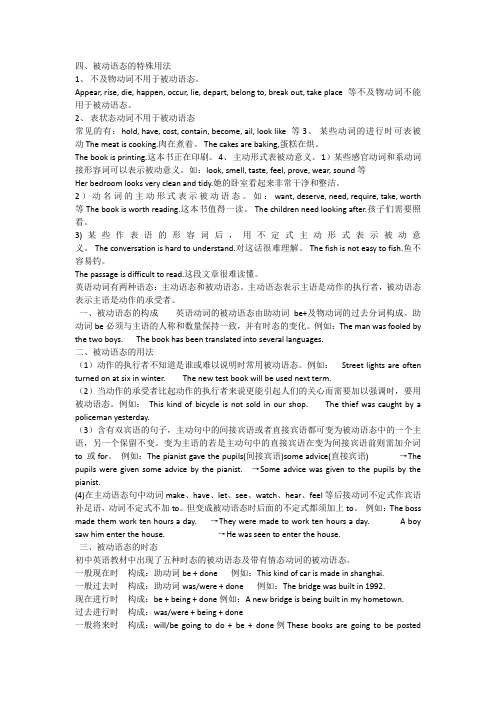
四、被动语态的特殊用法1、不及物动词不用于被动语态。
Appear, rise, die, happen, occur, lie, depart, belong to, break out, take place等不及物动词不能用于被动语态。
2、表状态动词不用于被动语态常见的有:hold, have, cost, contain, become, ail, look like等 3、某些动词的进行时可表被动 The meat is cooking.肉在煮着。
The cakes are baking,蛋糕在烘。
The book is printing.这本书正在印刷。
4、主动形式表被动意义。
1)某些感官动词和系动词接形容词可以表示被动意义。
如:look, smell, taste, feel, prove, wear, sound等Her bedroom looks very clean and tidy.她的卧室看起来非常干净和整洁。
2)动名词的主动形式表示被动语态。
如:want, deserve, need, require, take, worth 等 The book is worth reading.这本书值得一读。
The children need looking after.孩子们需要照看。
3)某些作表语的形容词后,用不定式主动形式表示被动意义。
The conversation is hard to understand.对这话很难理解。
The fish is not easy to fish.鱼不容易钓。
The passage is difficult to read.这段文章很难读懂。
英语动词有两种语态:主动语态和被动语态。
主动语态表示主语是动作的执行者,被动语态表示主语是动作的承受者。
一、被动语态的构成英语动词的被动语态由助动词be+及物动词的过去分词构成。
助动词be必须与主语的人称和数量保持一致,并有时态的变化。
- 1、下载文档前请自行甄别文档内容的完整性,平台不提供额外的编辑、内容补充、找答案等附加服务。
- 2、"仅部分预览"的文档,不可在线预览部分如存在完整性等问题,可反馈申请退款(可完整预览的文档不适用该条件!)。
- 3、如文档侵犯您的权益,请联系客服反馈,我们会尽快为您处理(人工客服工作时间:9:00-18:30)。
不及物动词没有被动语态
1. feel类(V+ N. + adj.)
这类动词作系动词的用法时,后面常接形容词或名词,有的后面可接to be,亦可省去。
这样的动词有:appear, prove, seem, turn, sound, look, feel, taste, smell, remain等。
例如:
He proves (to be) honest/(to be)an honest man.
—Haven’t seen you for ages! You look fine.
— Thanks. You look well. (NMET 1994)
I love to go to the seaside in summer. It feels good to lie in the sun or swim in the cool sea. (NMET 1996)
She looks familiar to me, but I don't remember her name. (NMET 1999)
2. read类(V +adj.)
此类动词的主动形式表被动意义,这样的动词有:sell, wash, read , rent, lock, tear, work out, act, break, carry, cook, count, cut, iron, clean, draw, keep, open, wear 等。
例如:
This sort of cloth washes well.
This kind of cloth wears well.
Your pen writes smoothly.
Your speech reads well.
Books of this kind sell well. (上海高考1999)
3. surprise类(V + O)
这类动词本身含有“使…”的意思,这样的动词有:seat, engage , amuse , surprise , becalm , belittle , delight , enable , enrich , remind, remove, strengthen, lengthen, deafen, darken, harden, sadden, worsen, whiten, simplify, solidify等。
例如:The kind of medicine has becalmed the patient.
Your visit last week delighted him.
That story reminded me of an experience I had long ago.
We have to take some measures to purify the air in this area.。
